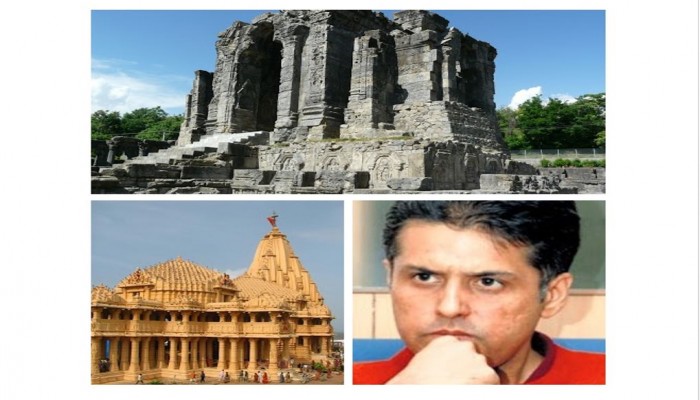Hindus are not Cowards, we are paying a price for forgetting our own History
- In History & Culture
- 03:46 AM, Nov 16, 2017
- Sunanda Vashisht
It is a story that bears repetition. Not because it is my story or story of lakhs of Kashmiri Pandits. It bears repetition because it is the story of our civilization and how time and again we have displayed the tendency to forget or airbrush our history and then paid a price for it. I have often wondered when Somnath temple was destroyed seventeen times by Mahmud Ghazni, was there no Hindu backlash? When temples across India were plundered and looted did no Hindu stand up and revolt? It seems impossible that Hindus accepted these stabs on their civilization meekly and turned the other way? Somebody could even ask, were Hindus Cowards? Who accepts such wounds without any retaliation? The fact is that Hindus were neither cowards nor were they weaklings. The local uprising probably never made it to the history books written in post independent India. The anguish of native Hindus was never recorded by Marxist historians. The result of this distortion is that today no one knows what Hindus did when Somnath was destroyed and plundered many times. It is impossible to believe that they were mute spectators.
This anguish of not remembering our history revisited me two days ago when I came across a question on Twitter.
-@AartiTikoo one thing that has always intrigued me is - and I can say this as a victim of Terrorism why did the Punjabi Hindu stay & the Kashmiri Pandits leave?. I mean no disrespect to either the Kashmiri Pandits or their tribulations and the enormous loss they have suffered https://t.co/yaBCIOgtde
— Manish Tewari (@ManishTewari) November 12, 2017
The stunning question was asked by ex I&B minister, spokesperson of Indian National Congress and a well-known politician. While nothing surprises me anymore, the naivete and manufactured earnestness of the question did shock me. Manish Tewari wanted to know why Hindus of Kashmir did not stay back in the valley like Hindus of Punjab and essentially fight back when terrorism engulfed the valley?
The essential corollary to this is -Were Hindus of Kashmir cowards? Why did they not stay back and get killed? Why did they flee? Muslims of Kashmir often taunt Hindus and call them ‘bhagoda’. It is a taunt we have learnt to live with like many other taunts, but the question from Congress politician was shocking and therefore needs to be answered. If we have already forgotten what happened merely 25 years ago, it is impossible that we will ever care to research what happened to Hindus few centuries ago when their temples were being plundered and their Gods were being desecrated. Lest the Congress politician and many more like him conclude that one-day Kashmiri Hindus just packed their bags and left their home of 5000 years in search of warmer climates, this story must be repeated.
The history of persecution of Kashmiri Pandits is as old as Islam in Kashmir. In 1989 when Islamist terror raised its ugly head in its latest avatar in valley, Pandits were a small micro minority. Many studies have concluded that in 1947, Hindus were only 6% of the population and by 1950’s they were reduced to 4-5%. A question that Manish Tewari should have asked is how did Kashmiri Hindus become a mere speck in the landscape? How did 100% Hindu valley become majority Muslim? Had Tewari asked this question he would have perhaps understood that why in their seventh exodus, the tiny minority had to leave with literally nothing but a shirt on their backs? Terrorism in Kashmir began with targeted killings of Hindus with full and complete acquiescence of majority Muslim community. Every neighbor turned against their Hindu neighbor. Many of them were guilty of actively harboring terrorists and vast majority guilty of not speaking up when terrorists were killing Hindus systematically one after another.
My family did not leave till August of 1990, when exodus had already begun in January of 1990. Sometime in July when we were the only Hindus left in our neighborhood, our neighbors unequivocally told my family that we must leave to save our lives, and no one could come to our rescue if anything happened. Our next-door neighbor’s son had become a terrorist and his mother would boast that her son had gone ‘apor’ (across the border) for ‘training’.
We lived in constant fear because our neighbors had either become terrorists themselves or were harboring terrorists. When P N Handoo, adviser to Jagmohan was shot dead by terrorists, an announcement was made in a nearby mosque that no one should help them. The announcement was fully complied with by the neighbors. When Ashok Qazi was shot and left to die on the same street that he was born in and terrorists urinated on him, not one neighbor came to help him. There are hundreds of such stories where betrayal happened in the backyard.
This was starkly different from what happened in Punjab. Hindus in Punjab comprise about 40% of the population. When state of Punjab was created, Hindus were about 50% of the population, some of them later moving out to Haryana, Himachal Pradesh and even Delhi. There was no history of hostilities between Hindus and Sikhs. There was no history of forced conversions or persecution. The social harmony between Hindus and Sikhs was at its benign best so much so that every Hindu family raised their oldest son as a Sikh.
The dharmic tradition from where Sikhism originated did not ask that all Kafirs be killed, nor did it ask for any conversions. Hindus and Sikhs ate together, participated in festivals together and in many instances inter married as well without any furor from the society. For all the nonsense of Kashmiriyat peddled, in real Kashmir Hindus and Muslims never inter dined, celebrated no festivals together and never inter married. This should come as no surprise because since the days of Sikandar-But-Shikan (destroyer of idols), Hindu community was at the receiving end of Islamist rulers. As their population kept dwindling, so did their fortunes.
Comparing Hindus of Kashmir to Hindus of Punjab or anywhere else is a not a correct comparison at all. Nowhere in Punjab will you find a “Batta mazaar”- graveryard of Hindus where a big stone was tied to Hindu men and they were drowned in the river. Batta Mazaar exists till this day. Sikhs never abandoned their Hindu neighbors even at the height of Khalistani movement. Muslims of Kashmir on the other hand were only too happy to get rid of Kafirs amongst them because they felt azaadi was just around the corner.
However despite all that social cohesion, Hindus did migrate from Punjab. All well off Hindus and Sikhs too sent their children and families to Delhi and other places. Since terrorism was mainly spread in rural areas, Hindus migrated to urban areas. You can see that division in population even today with rural areas in Punjab now dominated by Sikhs. There was no mass migration like it happened in Kashmir but in constant trickle Hindus did migrate. After that they returned back because of that basic social harmony that existed between Hindus and Sikhs. Punjabi Hindus also had families and relatives in neighboring states of Haryana, Himachal and Delhi. It was easy for them to move temporary base and then move back. Hence the temporary exodus of Punjabi Hindus never gained much news coverage.
Majority of Kashmiri Hindus were salaried class, with many of them rarely having ventured beyond Jawahar Tunnel. They had no relatives and friends spread across the country where they could go and come back. In fact all of them thought that this would be a temporary flight. I still remember my mother telling our Muslim neighbor that we would return when situation improves. Not one person thought that this would be permanent. Peace never returned to Kashmir, the hostilities only increased and it became impossible to return.
Going back to the main question of why did Pandits not choose to die and why did they flee? They were categorically given three options- to die, flee or convert. The state had completely capitulated in 1989. Chief Minister Farooq Abdullah, nursing his personal grudges had fled without even handing over charge formally to Jagmohan who had been appointed as the Governor. Pandits did not have numbers to organize themselves and fight. They had no access to arms and were faced with Kalashnikovs and AK-47’s.
They had already been threatened that jihadis would like to create Pakistan out of Kashmir with Pandit women but without Pandit men. Converting was not an option for them, dying was not an option either if it meant women would be abducted, raped and converted. Only option was to flee and that is what they did. They fled with a shirt on their back but with their dignity intact. They did not know 25 years later instead of understanding their plight, they would be asked by their own countrymen – Why did you run away and not get killed?
Manish Tewari is a victim of terrorism himself. For once he should forget that he is a congress man and therefore predisposed to rubbish history. These are civilizational battles and least one can expect for a Congress man is to rise above his party when dealing with existential questions. As far as airbrushing our history is concerned, 27 years later, Kashmiri Hindu exodus finds no place in history text books, nor do I have any hope that it will be ever be anything more than a footnote in history. A hundred years from now, no one will know Hindus too lived in the Valley once.
Image Credits:
Martand Temple- By Varun Shiv Kapur from New Delhi, India - Central shrine, CC BY 2.0, https://commons.wikimedia.org/w/index.php?curid=43379931
Somnath Temple- By Anhilwara (Own work) [Public domain], via Wikimedia Commons
https://twitter.com/ManishTewari







Comments